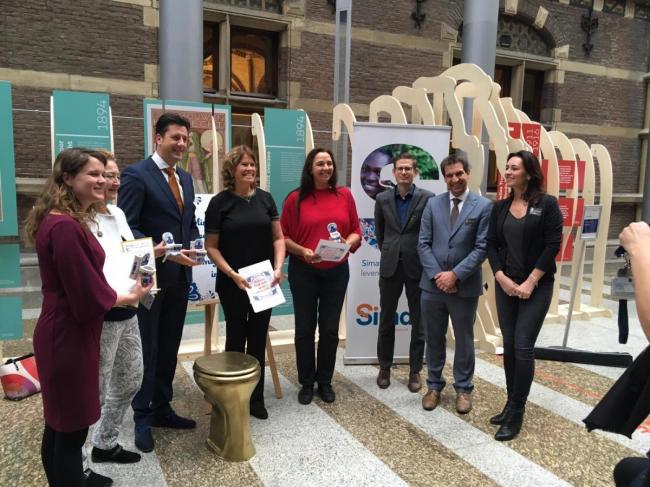Dutch organisations lobby for a credible plan to realise the 2020 sanitation targets.
Published on: 20/11/2018

Minister Kaag stated in the Policy Notice ‘Investing in Global Prospects’ that 50 million more people must have access to sanitary facilities by 2030 (SDG 6), with an interim target of providing 12 million extra people with sanitation by 2020. However if current trends don’t change, then this goal will not be achieved. We, the signatory organisations, one day after World Toilet Day, are asking parliament to address the Minister on this question next week when the 2019 Budget of Minister Kaag is discussed in Parliament.
2.3 billion people worldwide do not have access to basic sanitation, like toilets. A lack of sanitation can lead to drinking water becoming seriously contaminated, which in turn can lead to illness or death. Almost 1000 children die every day of diarrhoea caused by unnecessarily poor water and sanitation facilities – that’s 30 full school classes per day! Poor sanitation also spreads diseases like cholera, dysentery, hepatitis A and typhoid. Diarrhea is also an important cause of growing problems (stunting) and malnutrition in children.
Good sanitation is indispensable to human dignity and existence. It has a large impact especially on the lives of women and girls. Good sanitary facilities in schools contribute to more girls staying in school, even during menstruation. Good education has many positive impacts for girls and young women – it contributes to young girls having greater economic independence, enabling them to have children at a later age and can contribute to lower birth rate. A toilet also ensures that women and girls are safe and not harassed when they have to make a sanitary stop.
The agreed goal for 2030 will not be met if current trends do not change. In 2016 and 2017, 2.4 million people gain access to sanitary facilities and the Ministry expects to this number to reach 1.6 million people by 2018 - 2019. But in order to reach the interim goal in 2020, 4 million people must be reached. This is a challenge for national programmes of Embassies and central programmes of the Ministry: keep the results from 2020 on target. However this challenge is made even harder with the new geographic focus in the Policy Note for Foreign Trade and Development Cooperation. That’s why we ask Minister Kaag to:
Today we were at the Dutch Parliament to lobby for a credible plan to realise the 2020 #Sanitation targets. Watch the video and Like! #WorldToiletDay #WASH @SmitsStef @BuHa_OSTK @nwpnederland @Amref_NL @CvanBrenk @priesbertine @IRCWASH @dorcashulp pic.twitter.com/xHCMqR7xXl
— Simavi (@SimaviNL) November 20, 2018
The Manifesto has been endorsed by the following 13 organisations:
Adapted from an original press release by Simavi.
Update
On 28 November 2018, Minister Kaag announced in Parliament that the Netherlands is ahead of schedule to reach the interim target of providing access to sanitation for 12 million people. She added: "In the development of new programmes, account is taken of the ambitious growth in the achievement of results that will have to be realised after 2020. The cabinet will make this planning transparent for the House of Representatives in the budget for 2020" [Ministry of Foreign Affairs, 29 November 2018, BZDOC-1206054476-31 (in Dutch)].